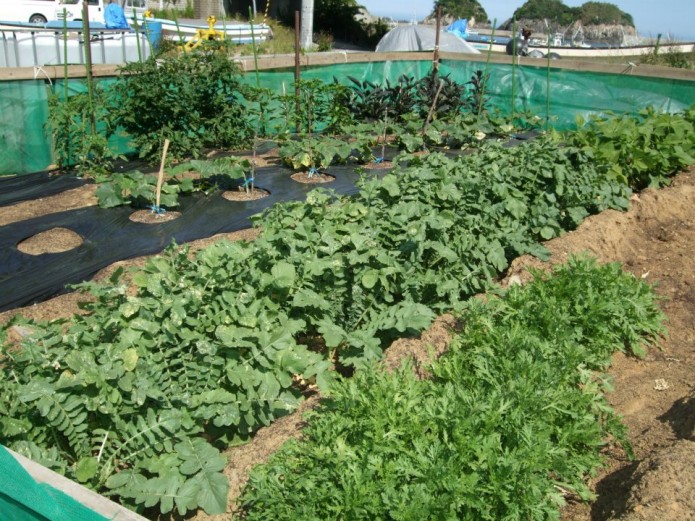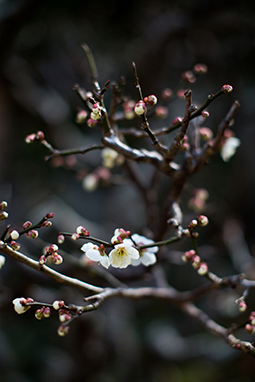Two years ago, the Great East Japan Earthquake rocked north-eastern Japan.
As the rebuilding of the region’s economic and social infrastructure continues, sustainable entrepreneurship is helping to keep afloat the aspirations of shattered localities.
Besides the bricks and mortar to replace structures, the recovery effort is highly dependent on intangibles to meet local needs: morale, hope and new ideas to promote sustainability of local assets.
Ingenuity and sensitivity to the region’s ecological heritage are called for on the part of individuals, non-profit organisations and businesses that, by combining their efforts, can go far in helping the people of Tohoku move towards a brighter future.
One of the shining stars is a firm set up, partly to assist Tohoku, by Aragon St-Charles: Japan Aquaponics. It teaches people an innovative method of growing food.
Water from a fish tank is pumped into a vegetable bed where plant roots hold together the growing medium—usually gravel or lava rock—and absorb nutrients from fish waste in the water. Once filtered, the water is recycled back to the fish tank.
Wishing to introduce the concept of aquaponics, St-Charles partnered with O.G.A. for Aid a small grassroots non-profit organisation in Minamisanriku, Miyagi Prefecture. A demonstration unit, full of life and hope, sits purring away in the NPO’s Seaside Center.
“The children in the community centre have been looking after the project, feeding the fish, planting seeds and harvesting what has been grown. By all accounts, the food production system has been very successful, with good lettuce growing, and it seems to be quite fruitful”, St-Charles wrote in an email.
While St-Charles looks for innovative solutions, growers and producers—especially in Fukushima Prefecture—face some of the region’s greatest challenges.
From farmers to fishermen, the triple disaster took an unprecedented toll in terms of land and livelihood. Yet many, such as Takako Kimura, remain determined to carry on.
Kimura, a farmer from Aizuwakamatsu, the western part of the prefecture, now finds her farm and business back on track. Her success is due in great part to the support she’s found at Tokyo’s Nippori Farmers Market.
At the small monthly market, Kimura has built up a base of regular customers who snap up her vegetables, homemade pickles and rice.
“I’m conscious of my Tokyo customers in everything I do. When I plant, I wonder if they’ll like this particular vegetable. When I harvest, I think about what they prefer in terms of looks and presentation”, she said.
Kimura has added smaller varieties to her selection with her Tokyo customers in mind: daikon, similar in size to a French breakfast radish, and miniature hakusai (Chinese cabbage).
Then there is Peace Boat. The non-profit organisation, focusing on creating peace at the grassroots level, first took on disaster relief after the 1995 Great Hanshin Earthquake in Kobe.
Since then, the organisation has sent volunteers around the world to help where hurricanes, earthquakes and other natural calamities have taken a toll. In March 2011, the organisation again found itself preparing to help in Japan.
Based in Ishinomaki, Miyagi Prefecture—one of the cities hardest hit by the earthquake and tsunami—Peace Boat works closely with community members to define and complete projects of all types and sizes. One of these is vegetable gardens.
In 2012, Peace Boat helped establish 130 gardens where survivors and volunteers replaced soil and removed debris in preparation for the next growing season. The harvest was beyond anyone’s imagination.
“Although they lost so much in the disaster, some residents said that having a garden was a chance for them to grow a new life”, said Maho Takahashi, program officer for Peace Boat’s Disaster Relief Department.
And there are countless other supporters, including 5ive Planets, an innovative NPO that is striving to educate children about sustainable technologies and resource management, and is working with Tohoku communities to find new economic engines.
WaviNavi, a monthly bi-lingual food delivery service, donates a portion of its proceeds to help women and children living in Tohoku.
Such efforts may seem tiny in the face of the huge task facing Japan, but small stones like these reinforce the foundation that the region needs for a solid future.
Lambswool Stole
Cozy and beautiful, this charming lambs wool stole is handwoven and hand dyed to ensure that each one is a special and practical work of art. Made in Iwate Prefecture, the stole will gradually soften over the years to become a cold weather favourite.
For more sustainable home ideas and bonus points, please email us mentioning BCCJ ACUMEN at: info@ecotwaza.com





